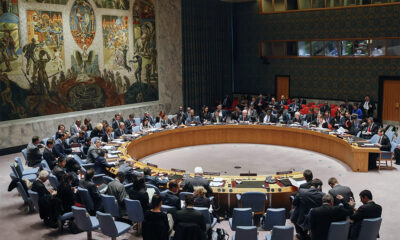COVID-19
Global Coronavirus cases exceed 15 million

Global coronavirus infections surged past 15 million on Wednesday, according to a Reuters tally, with the pandemic gathering pace even as countries remain divided in their response to the crisis.
In the United States, which has the highest number of cases in the world with 3.91 million infections, President Donald Trump warned: “It will probably, unfortunately, get worse before it gets better.”
The top five countries with the most cases are the US, Brazil, India, Russia, and South Africa.
But, the Reuters tally shows the disease is accelerating the fastest in the Americas, which account for more than half the world’s infections and half its deaths.
Globally, the rate of new infections shows no sign of slowing, according to the Reuters tally, based on official reports.
After the first COVID-19 case was reported in Wuhan, China, in early January, it took about 15 weeks to reach two million cases. By contrast, it took just eight days to climb above 15 million from 13 million reached on July 13.
Health experts stress that official data almost certainly underreports both infections and deaths, particularly in countries with limited testing capacity.
The official number of coronavirus cases at 15,009,213 is at least triple the number of severe influenza illnesses recorded annually, according to World Health Organization data, while the death toll of more than 616,000 in seven months is close to the upper range of yearly influenza deaths.
With the first wave of the virus still to peak in several countries and a resurgence of case numbers in others, some countries are reintroducing strict social distancing measures while others relax restrictions.
Stung by low approval ratings for his handling of the epidemic and downplaying the risks during the early stages, Trump made a significant shift in rhetoric on Tuesday, encouraging Americans to wear a face mask.
While the epidemic worsened in the United States, Trump’s focus ahead of a presidential election in November has been on reopening the economy, and governors in the hard-hit states of Texas, Florida, and Georgia continue to push back hard against calls for stricter restrictions.
In Brazil, more than 2.15 million people have tested positive including President Jair Bolsonaro, and more than 81,000 people have died.
While Bolsonaro has played down the outbreak, its scale has made Brazil a prime testing ground for potential vaccines.
India, the only other country with more than one million cases, reported almost 40,000 new cases on Wednesday.
Having been keen to reopen its economy, India is now facing the twin challenge of combating the pandemic and massive flooding in the country’s northeast.
Two ministers in South Africa’s cabinet were admitted to hospital with COVID-19, as Africa’s most-industrialized country counted a total of 372,628 confirmed cases and 5,173 deaths.
Other countries are reintroducing restrictions in response to fresh outbreaks.
In Spain, the number of people allowed on Barcelona’s beaches was limited after crowds flocked to the seaside over the weekend despite advice to stay home.
In Australia, residents of Melbourne, the country’s second-biggest city, were ordered to wear masks in public from Wednesday after the country reported a record 501 new cases.
Officials in Canada were closely watching a spike in cases as the economy reopens, attributing the rise in part to large numbers of young people gathering in bars.
China, meanwhile, announced that passengers on inbound flights must provide negative COVID-19 test results before boarding, as authorities seek to reduce the risk of imported cases amid increased international travel.
COVID-19
WHO declares end to COVID global health emergency

The World Health Organization said Friday that COVID-19 no longer qualifies as a global emergency, marking a symbolic end to the devastating coronavirus pandemic that triggered once-unthinkable lockdowns, upended economies and killed millions of people worldwide.
The announcement, made more than three years after WHO declared the coronavirus an international crisis, offers some relief, if not an ending, to a pandemic that stirred fear and suspicion, hand-wringing and finger-pointing across the globe, AP reported.
The U.N. health agency’s officials said that even though the emergency phase was over, the pandemic hasn’t finished, noting recent spikes in cases in Southeast Asia and the Middle East.
WHO says thousands of people are still dying from the virus every week, and millions of others are suffering from debilitating, long-term effects.
“It’s with great hope that I declare COVID-19 over as a global health emergency,” WHO Director-General Tedros Adhanom Ghebreyesus said.
“That does not mean COVID-19 is over as a global health threat,” he said, warning that new variants could yet emerge. Tedros noted that while the official COVID-19 death toll was 7 million, the real figure was estimated to be at least 20 million.
Tedros said the pandemic had been on a downward trend for more than a year, acknowledging that most countries have already returned to life before COVID-19.
He bemoaned the damage that COVID-19 had done to the global community, saying the pandemic had shattered businesses, exacerbated political divisions, led to the spread of misinformation and plunged millions into poverty.
When the U.N. health agency first declared the coronavirus to be an international crisis on Jan. 30, 2020, it hadn’t yet been named COVID-19 and there were no major outbreaks beyond China.
More than three years later, the virus has caused an estimated 764 million cases globally and about 5 billion people have received at least one dose of vaccine.
In the U.S., the public health emergency declaration made regarding COVID-19 is set to expire on May 11, when wide-ranging measures to support the pandemic response, including vaccine mandates, will end. Many other countries, including Germany, France and Britain, dropped most of their provisions against the pandemic last year.
When Tedros declared COVID-19 to be an emergency in 2020, he said his greatest fear was the virus’ potential to spread in countries with weak health systems.
Most recently, WHO has struggled to investigate the origins of the coronavirus, a challenging scientific endeavor that has also become politically fraught.
COVID-19
COVID-19 in Iran: Nearly 900 new cases, 24 deaths recorded

The Iranian health ministry announced on Sunday that more than 890 new cases of COVID-19 have been identified across the country during the past 24 hours, adding that 24 patients have died in the same period of time, Fars News Agency reported.
“A sum of 891 new patients infected with COVID-19 have been identified in the country based on confirmed diagnosis criteria during the past 24 hours,” the Iranian Health Ministry’s Public Relations Center said on Sunday, adding, “454 patients have been hospitalized during the same time span.”
The ministry’s public relations center said 611 people infected with COVID-19 are in critical condition.
COVID-19
China says 200 million treated, pandemic ‘decisively’ beaten

China says more than 200 million of its citizens have been diagnosed and treated for COVID-19 since it lifted strict containment measures beginning in November.
With 800,000 of the most critically ill patients having recovered, China has “decisively beaten” the pandemic, according to notes from a meeting of the ruling Communist Party’s all-powerful Politburo Standing Committee presided over by President and party leader Xi Jinping, AP reported.
China enforced some of the world’s most draconian lockdowns, quarantines and travel restrictions and still faces questions about the origins of the virus that was first detected in the central Chinese city of Wuhan in late 2019. Heavy-handed enforcement prompted rare anti-government protests and took a heavy toll on the world’s second-largest economy.
The official Xinhua News Agency quoted Xi as saying that policies to control the outbreak had been “entirely correct.” The abrupt lifting in November and December of the “zero COVID” policy that had sought to eliminate all cases of the virus led to a surge in infections that temporarily overwhelmed hospitals.
Case numbers have since peaked and life has largely returned to normal, although international travel in and out of China has yet to return to pre-pandemic levels.
China is now transitioning to a post-pandemic stage after a fight against the outbreak that was “extraordinary in the extreme,” Xinhua said.
The government will continue to “optimize and adjust prevention and control policies and measures according to the times and situations with a strong historical responsibility and strong strategic determination,” Xinhua said.
-

 Sport5 days ago
Sport5 days agoACL draw to be broadcast live on ATN channels
-

 Regional5 days ago
Regional5 days agoIRGC chief warns of harsher response if Israel attacks Iran
-

 Sport3 days ago
Sport3 days agoACL fever grows as fixtures finalized
-

 Regional5 days ago
Regional5 days agoIran launches retaliatory attack on Israel with hundreds of drones, missiles
-

 Latest News5 days ago
Latest News5 days agoContact group on Afghanistan hits roadblock over Pakistan’s gripe with India
-

 Sport5 days ago
Sport5 days agoHetmyer powers Rajasthan win in low-scoring IPL thriller
-

 World5 days ago
World5 days agoUN Security Council to meet Sunday on Iran attack
-

 World4 days ago
World4 days agoUS will not take part in any Israeli retaliatory action against Iran
























